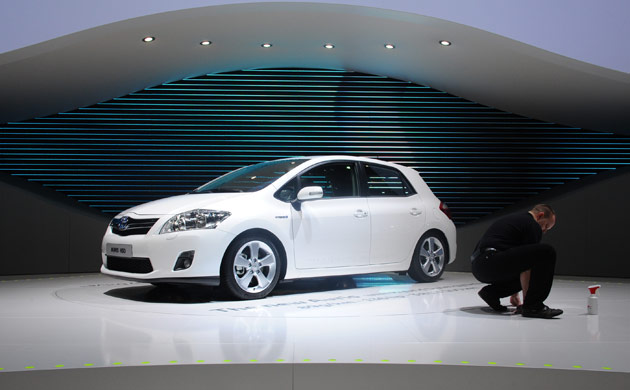
Winner of WhatGreenCar award 2010
The Hybrid Synergy drive system is almost identical to that of the successful Prius, emitting just 89 gCO2/km on the standard test cycle. The Auris is the first full hybrid in 'small family' car class, and features a 1.8 litre VVT-i petrol engine and two electric motors that work together to deliver power to the wheels in the most efficient way. The result is very low emissions and a combined fuel economy of 74.3 mpg. As in the Prius, the driver is able to switch between the power options: driving in EV-mode (electric only when batteries have sufficient charge), ECO-mode (the car decides how to use energy sources most efficiently), and POWER-mode (petrol and engine and batteries are used to maximum effect). Auris drivers will be exempt from road tax and the London congestion charge. Available from 1st July.
Photograph: Bloomberg/Getty Images
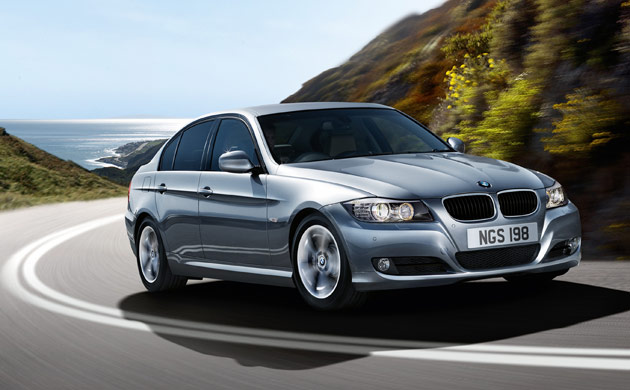
Highly Commended by WhatGreenCar award 2010
BMW has created the greenest ever 3 series with the introduction of this new 320d EfficientDynamics model, having bought the CO2 emissions down to a very impressive 109 g/km; the best-in-class figure for a compact executive car. Its CO2 emissions place it in tax band B, rewarding it with free first year road tax and just £20 a year thereafter. The 320d comes fitted with the existing EfficientDynamics technologies from previous models, including start-stop and regenerative braking etc, but heightened environmental performance is reached due to changes in engine construction and transmission, lowered suspension and improved aerodynamics. Alongside the improved emissions and efficiency figures, this model will reach 137 mph and does 0 to 62 in just 8.2 seconds (well, it is a BMW). Available now.
Photograph: BMW/Newpress.co.uk
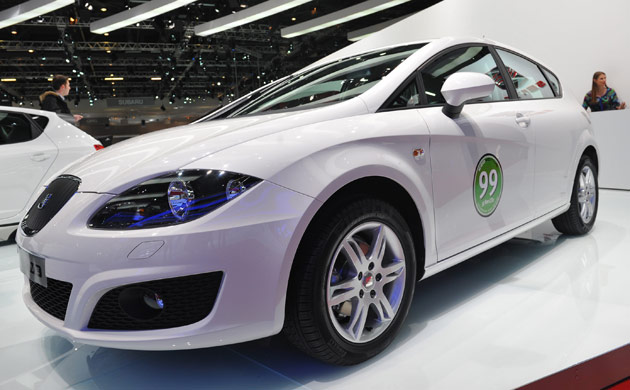
Highly Commended in WhatGreenCar awards 2010
With the same engine and technologies as the VW Golf BlueMotion, the less expensive Seat Leon Ecomotive proves that going green needn't be painful. The features that help to place the emissions at 99 g/km CO2 include the use of a smaller engine with turbocharger, start-stop technology, diesel particulate filter, improved aerodynamics and longer gear ratios. The result is low emissions, zero 'road tax' and an impressive combined fuel economy of 74.3 mpg. That said, the Leon can reach 116 mph and achieve a 0 to 62 time of 10.9 seconds. The Leon Ecomotive is also considered to have a relatively low depreciation rate and reliability is reported as high. Oh yes, did we mention that it's cheaper than the similarly performing Golf BlueMotion? Available now. Links: Seat's Ecomotive range.
Photograph: Bloomberg/Getty Images
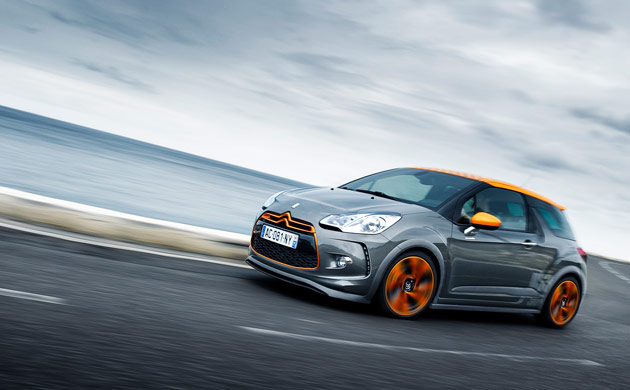
Highly Commended in WhatGreenCar awards 2010
Although the Citroen DS3 is a conventionally fuelled option, it's CO2 emissions are less than 100 g/km, placing it as a band A car and making it exempt from road tax. The new DS3 is stylish and is literally designed as a rival to the iconic Mini. Many features used on the DS3 contribute to its low emissions of just 99 g/km and fuel efficiency of 74.3 mpg (around a 7.4p per mile average fuel cost), including carefully designed aerodynamics, a diesel particulate filter and appropriate gear ratios. Although frugal, the DS3 holds its own on the road, and can do 0 to 60 mph in 11.5 seconds. This is expected to be the fist model in the 'DS' series for Citroen, with 'DS4' and 'DS5' planned over the coming years. The DS3 price range starts at £11,700. Available now.
Photograph: Citroen/newspress.co.uk
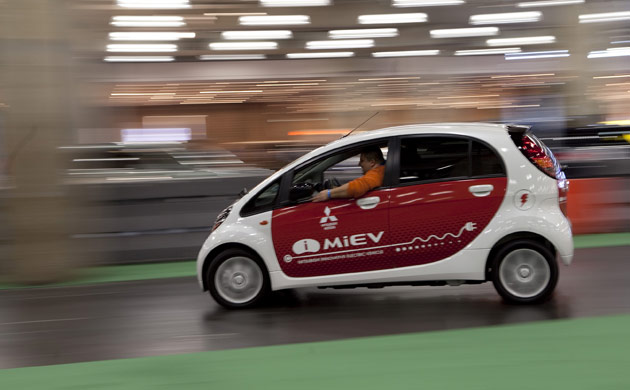
WhatGreenCar awards 2010's car to watch
The i-MiEV is a proper four-seat electric car (as opposed to a quadricycle). Bigger than the G-Wiz, and with more room than the two-seater MINI E, the i-MiEV shares the same body as its petrol-engine counterpart, the Mitsubishi 'i'. The car has a respectable performance of 0 to 62 mph in 13 seconds, a top speed of 87 mph, and an impressive 100 mile range. On a fast charge, the 47 kW Lithium-ion batteries can be filled to 80% in just 20 minutes, or 'slow' charged within 7 hours. However, zero-emission motoring does come at a cost, outright purchase costs excluding any grants are £38,699, which is very high, and over four times the cost of the petrol 'i' version. That said, fuel costs are less than 2p per mile, road tax is free, and the car will qualify for congestion charge exemption. Available to order Autumn 2010.
Photograph: Bloomberg/Getty Images
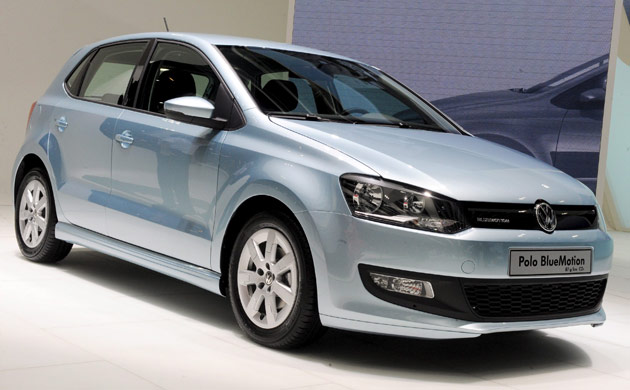
This diesel BlueMotion produces the lowest WGC rating of any conventionally fuelled supermini available to buy in the UK. At just 89 gCO2/km, the Polo BlueMotion falls comfortably into VED band A, so it is exempt from road tax. The modifications used on this model to achieve these low emissions include: a diesel particulate filter, improved oxidation catalytic converter, longer gear ratios, aerodynamic front grill, smaller door mirrors, subtle side skirts as well as other drag reduction features. The Polo BM is also fitted with lower rolling resistance tyres mounted on specially designed alloy wheels. The result is a very impressive combined test fuel economy of 83.1 mpg. Prices start at £14,445; with the added benefits of low average fuel costs (around 6.6p/mile). Available now.
Photograph: Uli Deck/Epa/Corbis
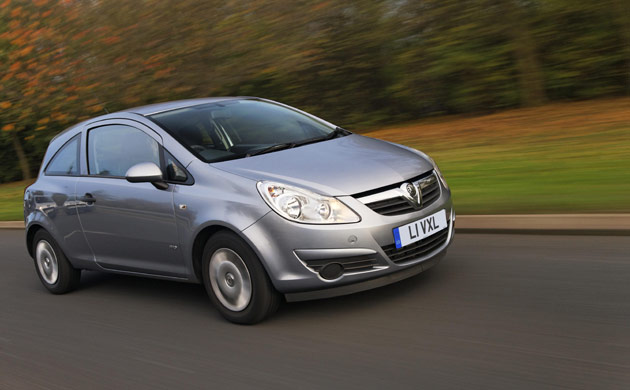
The Vauxhall Corsa has long been a popular model in the UK, and improvements in efficiency should make this model an even more attractive choice for prospective car buyers. Even in 5-door trim, the Corsa ecoFLEX achieves 98g/km (76.3 mpg and 7.2p per mile fuel costs) and is equipped with a Diesel Particulate Filter (DPF) and start-stop as standard. As a result, Corsa ecoFLEX drivers will benefit from not only the lowest 13% BIK diesel band, but also full exemption from 'road tax'. Despite the improvement in fuel consumption and emissions, the ecoFLEX can reach 110 mph and is capable of a 0 to 60 time of 11.5 seconds. To achieve its low emissions, the 1.3 CDTi engine employs a variable geometry turbocharger, 20mm lower ride height than standard and low-rolling resistance tyres. Available now.
Photograph: Vauxhall/newspress.co.uk
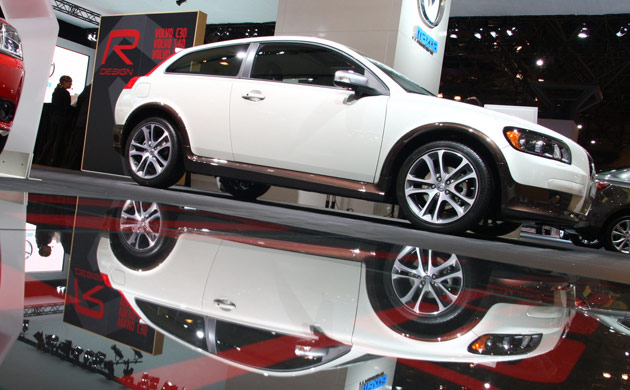
WhatGreenCar 2010 judge Russel Brave gave the Volvo C30 DRIVe coupe one of the award's best reviews: "it is easily my favourite 'green' car to date because it is enjoyable to drive, yet naturally economical without any effort from the driver". Being based on the popular 480 model, the C30 has much improved environmental credentials, emitting just 99 gCO2/km and achieving a combined fuel economy of 74.3 mpg. These green credentials make it exempt from road tax with an average fuel cost of only 7.4 p/mile. Onboard low-emissions technologies include start-stop and regenerative braking, which together with its sleek aerodynamic design, combine to give the C30 an impressive WGC rating of only 29. Performance-wise, the C30 has a 0 to 60 time of 10.7 seconds, with a top speed of 118 mph. Volvo say that the C30 is 85% recyclable, and on the road prices for the start-stop model are £17,690. Available now.
Photograph: Corbis
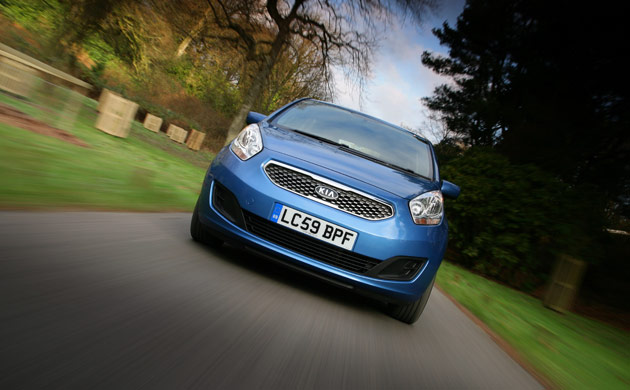
For something slightly larger, the new Venga is a compact MPV that has made use of several new technologies (now becoming standard) to achieve a WGC rating of just 33, the best rating in its class. Kia's EcoDynamics badge means that it uses start-stop technology, low-rolling resistance tyres and optimum shift indicator which helps the driver to operate the vehicle most efficiently. These help towards the combined fuel economy of 62.8 mpg, and only produces 117 gCO2/km, placing the Venga into VED tax band C. This makes this model exempt from first year road tax; owners will pay £30 annually from the second year onwards, rather cheap when compared to other MPVs. Available now.
Photograph: Kia/newpress.co.uk
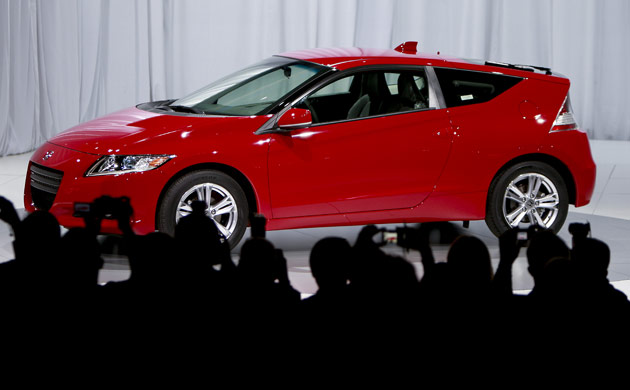
The new Honda CR-Z is the first sporty hybrid to come to the UK market. The car uses a 1.5 litre 4 cylinder engine and an electric motor IMA system with a manual transmission, another first for a hybrid model. While not as strong a hybrid as compared to Toyota's Hybrid Synergy drive, the CR-Z's CO2 emissions are still remarkably low for its class at 117 g/km, which puts the car into band C for road tax, with the first year free and price per year from year two is £20. The IMA technology gives the model a combined fuel economy of 56.4 mpg, a figure helped by the use of regenerative braking. For those that might be concerned about the environmental impacts of using a larger battery, Honda claim it to be largely recyclable at the end of its life. The CR-Z's green credentials are rewarded in London as it receives the full 100% discount from the congestion charge. Available now.
Photograph: Bloomberg/Getty Images







